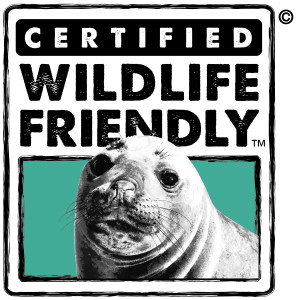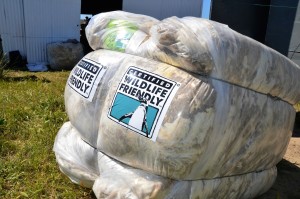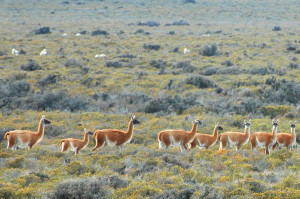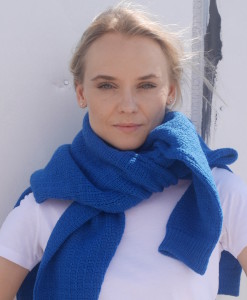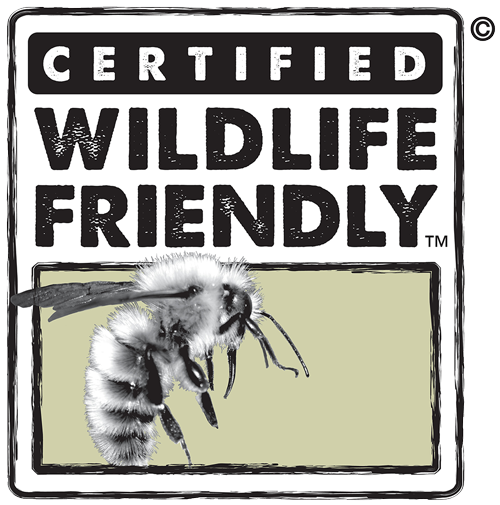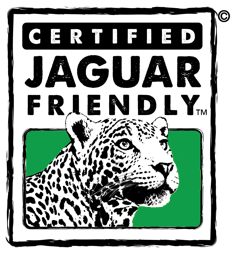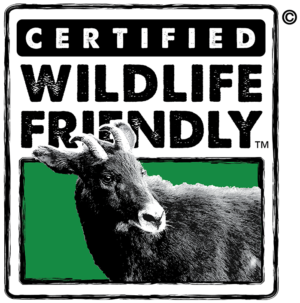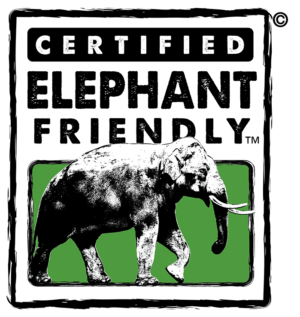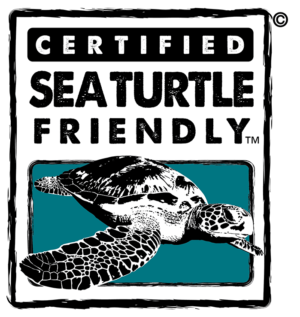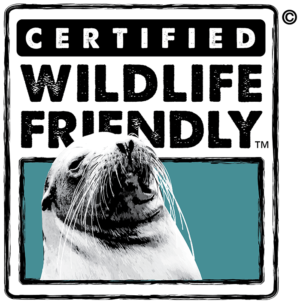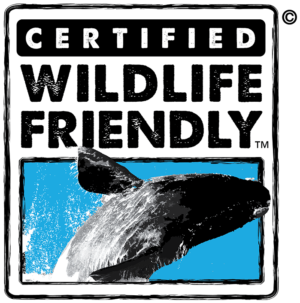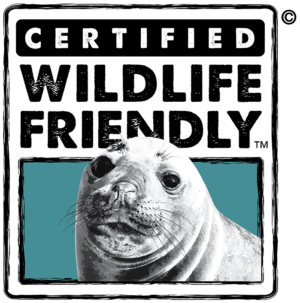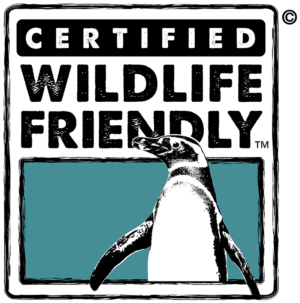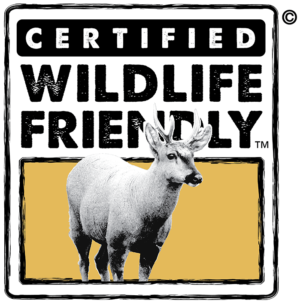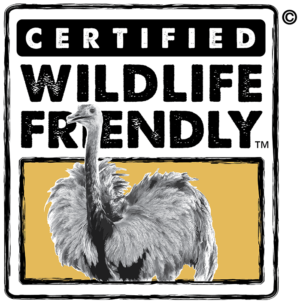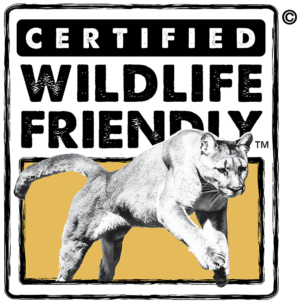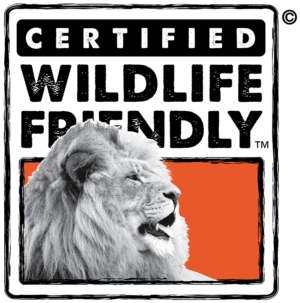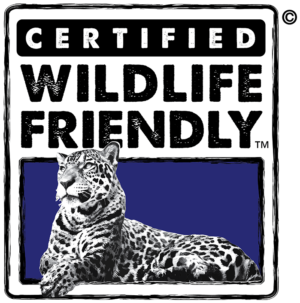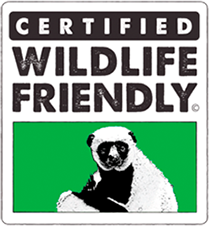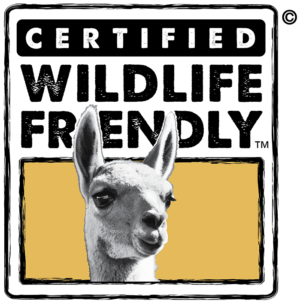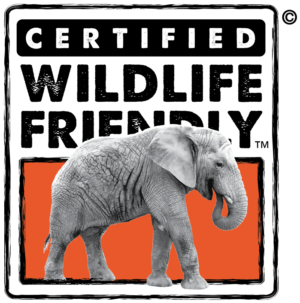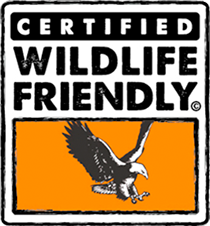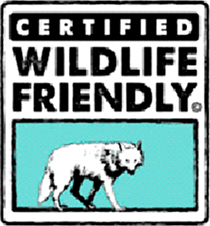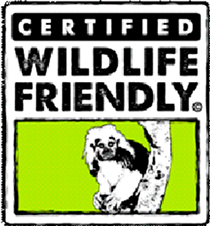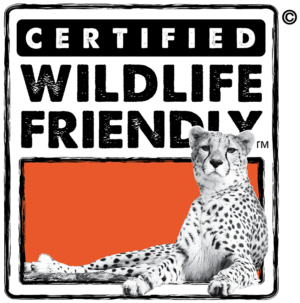Mohair Merino & Cashmere Certified Wildlife Friendly™ in Neuquen Argentina
Sustainable products promote coexistence between native wildlife
and fiber production
FOR IMMEDIATE RELEASE
The Wildlife Friendly Enterprise Network (WFEN) and the Wildlife Conservation Society Argentina (WCS) are pleased to announce the Wildlife Friendly™ certification of high quality mohair, merino wool, and cashmere, in recognition of the efforts of a cooperative of criancero herders to co-exist with the region’s native wildlife.

Local mixed-breed dog working as a guarding dog for goats. Credit: Alejandro Gonzalez.
Following years of work to improve land management practices and fiber quality, and support from WCS, 12 herders of the Neuquén, Argentina-based Programa Mohair are now offering both raw fiber and spun yarn for sale, under the Fibras del Viento (Fibers of the Wind) label. Fibers are available in natural colors and dyes, including green from Yerba mate, the national beverage of Argentina. Fine yarn and finished goods are spun and handcrafted at a small mill operated by cooperative members.
“The commitment of these herders participating in the Programa Mohair shows that it is possible to improve land use practices and combine increased product value with real conservation results. This is a high impact social and wildlife achievement that we hope will inspire other livestock producers in Patagonia,” said Guillermo Harris, WCS Argentina Director.

Puma in Laguna Blanca National Park, where some of the certified herders live. Credit: WCS Argentina
The actions of the livestock herders to coexist with native wildlife are important to the conservation of the unique fauna criollo dogs to protect their livestock from predators. Although their family farms are small, and they often struggle to maintain their livelihood, the herders are committed to sustainable production for the good of their land, livestock, and native wildlife.
“We are watching a Wildlife Friendly™ fiber movement unfold right now across Patagonia” said Julie Stein, Executive Director and Co-founder of WFEN. “Part of our mission is to create communities of practice that share innovations, challenges and successes across landscapes. These Programa Mohair herders and a growing number of ranching neighbors are at the leading edge of that effort. Designers, consumers and companies are taking note of their compelling stories of coexistence. Each step forward by these producers has been the result of hard work, and is thrilling to witness. We congratulate these heroes of conservation for their actions.”
Consumers wishing to purchase these responsibly produced fibers can write to ventas.fibrasdelviento@gmail.com or coopeagropezapala@gmail.com

Products made from mohair and mohair-merino blends. Credit: Susan Walker
###
About Wildlife Friendly Enterprise Network
WFEN and its Certified Wildlife Friendly®, Predator Friendly®, Certified Gorilla Friendly™, Jaguar and Sea Turtle Friendly™ certification programs represent grassroots farmers, ranchers, artisans, indigenous peoples and conservation heroes from around the world including two World Bank Development Marketplace Award winners, a U.N. Equator Prize winner, leadership in the world’s marketplace for REDD+ Carbon Offsets, a Time Hero for the Planet, and a National Geographic Big Cats Initiative grantee. Certified Wildlife Friendly® products contribute to the conservation of over twelve million hectares of diverse wetlands, forests, and grasslands; protect keystone endangered species in Asia, Africa, Europe, and Latin and North America, including the Snow Leopard, Elephant, Tiger, Cheetah, Red Panda, and Wolf; and benefit over 200,000 people through increased food security, income and employment. For more information visit: www.wildlifefriendly.org
About WCS (Wildlife Conservation Society)
MISSION: WCS saves wildlife and wild places worldwide through science, conservation action, education, and inspiring people to value nature. To achieve our mission, WCS, based at the Bronx Zoo, harnesses the power of its Global Conservation Program in nearly 60 nations and in all the world’s oceans and its five wildlife parks in New York City, visited by 4 million people annually. WCS combines its expertise in the field, zoos, and aquarium to achieve its conservation mission. Visit: newsroom.wcs.org Follow: @WCSNewsroom. For more information: 347-840-1242.
Visit: www.wcsargentina.org;
https://www.facebook.com/TheWCS;
https://www.youtube.com/user/WCSMedia
Follow: @thewcs
Contact:
Wildlife Friendly
WCS Argentina’s Patagonian Fibers with a Conscience™ Program and Certified Wildlife Friendly™ Ranchers Make Wool Available Sustainable Fashion Buyers
FOR IMMEDIATE RELEASE
Puerto madryn, Argentina (November 4, 2016)—The Wildlife Friendly Enterprise Network (WFEN) and the Wildlife Conservation Society-Argentina (WCS) are pleased to announce traceable Certified Wildlife Friendly® wool—part of the “Patagonian Fibers with a Conscience” program—from the “Merino de Peninsula Valdés™” ranchers who raise wool in coexistence with wildlife on Peninsula Valdés. The traceable certified wool is now available for purchase through a new online portal.
WCS Argentina supports the ranchers of the Merino Peninsula Valdés™ group who are committed to managing their ranches to allow healthy populations of guanacos, rheas, and maras to co-exist with their sheep, and to use non-lethal methods to control predation by pumas, chilla foxes, and Geoffroy’s and pampas cats. Fundación Vida Silvestre Argentina (FVSA) will provide third-party verification of compliance with commitments and collaborate with WCS to monitor impacts on wildlife. “We all agree in making the coexistence between sheep ranching and healthy wildlife a long-term achievement,” said Alejandro Arias, coordinator of the FVSA program in Península Valdés.
Península Valdés is a 4,000–square-kilometer (1,544 square miles) protected area in Patagonia, declared a UNESCO Natural World Heritage Site in 1999. Compared to other sites in the region, the steppe of Península Valdés still harbors significant populations of native wildlife, and its waters are critical habitat for southern right whales, sea lions, and elephant seals during reproduction. Although a management plan has been effective in conserving coastal wildlife, the land is privately owned and sheep ranching is widespread within the area.
“These ranchers are committed to implement wildlife-friendly practices because they are convinced that their economic futures are better served by moving away from maximizing sheep stocking rates on their ranches and adding value by conserving native species at Península Valdés, an emblematic site of Patagonia. To achieve our goals, we are implementing management actions based on scientific research on wildlife ecology,” said Ricardo Baldi, a scientist from CONICET, the Argentine national science agency, and consultant for WCS.
“’Patagonian Fibers with a Conscience™’ serves as an inspiring example of how to combine sustainability with effective conservation,” said Dr. Guillermo Harris, Director of WCS’s Argentina Program. “We’re showing that we can protect guanacos and other wildlife and support the local economy. It’s a win-win for Peninsula Valdés.” WCS work with these ranchers is supported by the USFWS Wildlife without Borders program.
“We’ve had keen interest in this wool from the sustainable fashion industry,” said Julie Stein, Executive Director of WFEN, a global community dedicated to enterprises that contribute to the conservation of threatened wildlife and to the economic vitality of rural landscapes. “It’s very exciting. For example, luxury-brand Bolek, has utilized this wool for their upcoming knitwear capsule collection.“
“Projects like Wildlife Friendly® and Merino de Peninsula Valdés™ give new designers like me the unique opportunity to do what is right from the beginning,” said Sarah Chojecki, founder of Bolek. Ms. Chojecki, a graduate of the Fashion Institute of Technology, is headquartered in New York City and curated a partnership with Wildlife Friendly® on the basis that consumers should have ecological awareness and sustainability in the forefront of their minds when purchasing.
“This is one of the only landscapes in the world where wool is produced adjacent to a thriving marine ecosystem. It’s special,” Ms. Chojecki mused. “To have ranchers that go the extra mile to allow wildlife to have a safe refuge on private lands. It’s important. More individuals should be like this.”
“We applaud forward thinking designers like Ms. Chojecki for building wildlife and sustainability into the DNA of their companies,” said Ms. Stein.
The shearing season in Patagonia occurs during October and November and wool is available for purchase beginning in December of each year. To learn more about wool specifications please visit the Merino de Península Valdés website. To inquire about purchasing Certified Wildlife Friendly® wool from the Merino de Península Valdés™ group please contact Merino de Peninsula Valdés™
###
About Wildlife Friendly Enterprise Network
WFEN and its Certified Wildlife Friendly®, Predator Friendly®, Certified Gorilla Friendly™, Jaguar and Sea Turtle Friendly™ certification programs represent grassroots farmers, ranchers, artisans, indigenous peoples and conservation heroes from around the world including two World Bank Development Marketplace Award winners, a U.N. Equator Prize winner, leadership in the world’s marketplace for REDD+ Carbon Offsets, a Time Hero for the Planet, and a National Geographic Big Cats Initiative grantee. Certified Wildlife Friendly® products contribute to the conservation of over twelve million hectares of diverse wetlands, forests, and grasslands; protect keystone endangered species in Asia, Africa, Europe, and Latin and North America, including the Snow Leopard, Elephant, Tiger, Cheetah, Red Panda, and Wolf; and benefit over 200,000 people through increased food security, income and employment. For more information visit: www.wildlifefriendly.org
About the Wildlife Conservation Society (WCS)
MISSION: WCS saves wildlife and wild places worldwide through science, conservation action, education, and inspiring people to value nature. VISION: WCS envisions a world where wildlife thrives in healthy lands and seas, valued by societies that embrace and benefit from the diversity and integrity of life on earth. To achieve our mission, WCS, based at the Bronx Zoo, harnesses the power of its Global Conservation Program in more than 60 nations and in all the world’s oceans and its five wildlife parks in New York City, visited by 4 million people annually. WCS combines its expertise in the field, zoos, and aquarium to achieve its conservation mission.
Visit: www.wcs.org;
https://www.facebook.com/TheWCS;
https://www.youtube.com/user/WCSMedia
Follow: @thewcs
Contact:
Wildlife Friendly
Julie Stein: Julie@wildlifefriendly.org
Facebook
Twitter
Instagram


